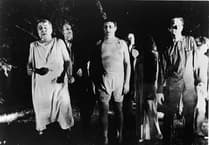A GROUP campaigning to clean up the Wye has been given nearly £10,000 of Lottery funding to help figure out where the pollution that blights the river is coming from.
The Friends of the Upper Wye, which formed last year, says better monitoring by its volunteers, who now number over 100, will help it find out where nutrients, are entering streams and rivers in the Wye catchment, "and use that information to drive change to clean up our rivers".
The award of £9,880 is close to the maximum available under the National Lottery’s Together for Our Planet programme.
It will mostly pay for kits to test river samples for phosphate and nitrate content, turbidity (cloudiness), conductivity and temperature, according to the group’s volunteer coordinator Nicola Cutcher.
"Our work with Cardiff University has shown that the results of this testing compare favourably with tests in the lab," she said.
"Our aim is to get local people to act as guardians of their stretch. The environmental authorities test very rarely, so don’t understand where the pollution is coming in."
This could be not only from farms, but also local water treatment plants or septic tanks, she explained.
The Environment Agency (EA) had previously funded testing by the group, but that has now run out.
"That gave us six months of data but we need at least a year’s worth," Cutcher said. "Winter is when runoff from the fields is worst."
Information will then be passed to authorities, and MPs, "to put pressure on them to clean up the river", she said.
"The EA acknowledges there is a crisis and has issued a briefing note on how they will integrate this information into their work. We hope Natural Resources Wales will now step up and follow their lead."
The funding will also help fund training of volunteers, and promote and share the group’s work, for example by mapping it online, she added.
The group’s work straddles the English-Welsh border, covering the river’s catchment from its source at Plynlimon to its merger with the Lugg at Mordiford between Hereford and Ross-on-Wye.
Meanwhile campaign group People for the Ethical Treatment of Animals (PETA) has named Powys County Council "Worst Council in the UK" for approving more than 150 intensive chicken farms in the past five years.
With eight million chickens now being raised in the county’s "mega-farms", nearby rivers including the Wye are "turning into ’pea soup’ from all the manure, chemicals, and other muck associated with these facilities", PETA said in a letter to councillors.
It told them that "a lump of coal, as is traditionally given to those on the ’naughty list’, will be delivered to you in time for Christmas Day".
A Powys County Council spokesperson said: "The number of applications being made in Powys reflects the importance of agriculture to the Powys economy and the need for farming businesses to diversify."




